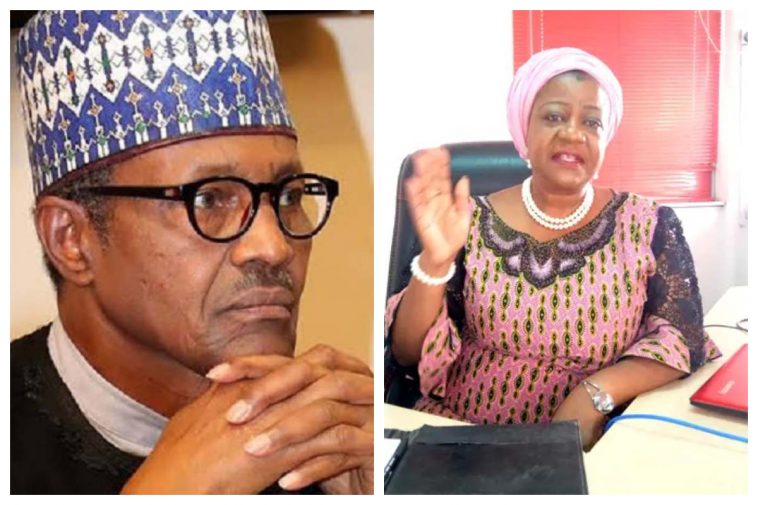Peter Jerome
The rejection of Lauretta Onochie’s nomination as national commissioner of the Independent National Electoral Commission (INEC) was received with thunderous appreciation just as her nomination earlier by our President Muhammadu Buhari was welcomed with an equal sound of rejection. Mr. President’s actions had raised serious criticism and pressure on the national assembly to honorably reject the choice.
Civil societies, Interest groups and Political parties as well as Analysts questioned the integrity of subsequent elections to be conducted in the country, describing the possibility of midwifing a dangerous electoral system for our democracy. Those who argued against the nomination described the nomination as outrageous and against the tide of the moral train.
Onochie being an active member of the ruling All-Progressive Congress, her denial against available facts seem to suggest the ill intention of those that recommended her. Also, that exposed a major character deficiency since she only denied a truth that was already in the public domain. Before then, it did appear that the Senate was unwilling to turn down the Presidential request owing to the growing tendency and pronouncement of the principal officers particularly the Senate president, to support all bills emanating from the state House without delay or questioning since the President is “always right”.
To further complicate the country’s electoral story, information of the national assembly’s rejection of the electronic transmission of election results and deliberate manipulation of the electoral act amendment bill according to sources, does not reflect the overall view of Nigerians.
The electronic transmission of the election results is being perceived in several quarters as an opportunity for the electorates to have their votes count at least as part of the promised change even if late in coming. Technology monitoring of results collation may help to curb the reoccurring incidence of results adulteration during collation, a case of a candidate winning at the voting centers but losing at the collation unit. It promises to guarantee transparency in the electoral process to a reasonable extent.
The national assembly however, though for a distant reason, rejected Onochie’s nomination for the INEC job in a perceived attempt to distract the lurking eyes of scrutiny and to galvanize trust and goodwill from Nigerians before robbing them with the left hand.
The irrevocable truth is that, placing these two public prayers in a juxtaposition; Onochie’ INEC engagement and the electoral act amendment bill which off course includes the electronic transmission of election results by INEC, the latter is a more pressing need for Nigerians by Nigerians than the former. This is because the wish of every electorate is for his/her vote to count in any election exercise and since the electronic transmission of votes promises that, then the tendency for them to receive it with open arms becomes imminent.
According to the Centre for Democracy and Development (CDD) who observed in their report titled ‘COUNTING THE VOTES’ – a postmortem analysis of ward-level collation during Nigeria’s 2019 presidential election, collation of results had been a much-exploited weakness in the Nigerian election process since the country’s return to democratic civilian rule in 1999.
Relying on documentary evidence from 8,809 election observers accredited by the Independent National Electoral Commission (INEC), the CDD report concluded that in the 2019 elections, civil society observers across Nigeria saw a collation process that was chaotic, vulnerable to manipulation and, in some locations, violently disrupted and unnecessarily opaque.
From the above, we can see that election exercise in Nigeria has always been marred by irregularities such as intimidation of collation officers by politicians, security agents and thugs, as well as misconduct by INEC staff and logistical shortfalls. Therefore, the introduction of the electronic result transmission system, will come as rescue to the system. This is because, vote count remains the oxygen of democracy and the definitive characteristics of popular opinion. It will not only protect the integrity of the democratic values but will encourage rapid decline in election apathy.
CDD Director Idayat Hassan, who has monitored elections in several countries, highlighted how electronic transmission of results would affect elections in Nigeria. Hassan who was part of the CDD team that prepared the report on the 2019 presidential elections, disclosed to the ICIR that the electronic transmission will address defects in the manual collation of results. Citing that the report on the 2019 presidential poll provided compelling evidence on the need for electronic transmission of results in Nigeria, Hassan added that electronic transmission would ‘cure the logistical nightmare’ often encountered in manual collation of results.
“In every election, we have cases where collation officers are ready but there are no vehicles. Sometimes, they need generating set or they will not even know where to collate and these challenges muddle up the entire collation system.”
Snatching of ballot materials and interference by politicians, security agents and thugs and the capacity of returning officers to influence the outcome of elections – willfully or by coercion which are common features of elections in Nigeria, Hassan said would be eliminated by electronic transmission of results.
“It will eliminate interference by security agents, politicians and even thugs in the collation process. There will not be reason to kidnap electoral officials and snatch ballot materials,” she said.
In some recent elections, particularly in the September 2020 Edo and October 2020 Ondo State governorship polls, INEC had adopted the electronic transmission of results a development that was commended by stakeholders. The commission had, in the past, expressed readiness to adopt electronic voting, including the transmission of results by electronic means and its Chairman Mahmud Yakubu had urged the National Assembly to amend the Electoral Act to make provision for electronic collation and transmission of election results, which was one of the factors that necessitated fresh amendments to the Electoral Act which originally made provisions for electronic transmission of results but just as the Senate was set to pass the bill, a strange Section 50(2), which completely outlawed transmission of votes by electronic means, appeared in the draft legislation. Section 50(2), which was hitherto not part of the amendment bill, stated:
“Voting at an election under this Bill shall be in accordance with the procedures determined by the commission, which may include electronic voting provided that the Commission shall not transmit results of the election by electronic means.”
This has provoked outrage and disapproval from many Nigerians at home and in diaspora and the controversial INEC commissioner nomination by the presidency heightened the tension on the lawmaking body.
Thus, as the bill was presented at the red chamber, by the senate committee on INEC, the President of the Senate, Ahmad Lawan, on Wednesday during the plenary raised the alarm that some mischief-makers and rabble-rousers were blackmailing the National Assembly leadership over the Electoral Act (amendment) Bill, claiming that it was the first time the report of the committee was brought to the house. He stated expressly that if anybody feels strongly about anything, he, or she, should meet the senators to canvass for their positions rather than blackmailing their leadership, adding that they have a procedure, and lobbying is part of it.
From the foregoing’s, what is the guarantee that Onochie’s dismissal was not a Greek gift to rob Nigerians in the Electoral Act (amendment) Bill with regards to the electronic transmission of election results?






